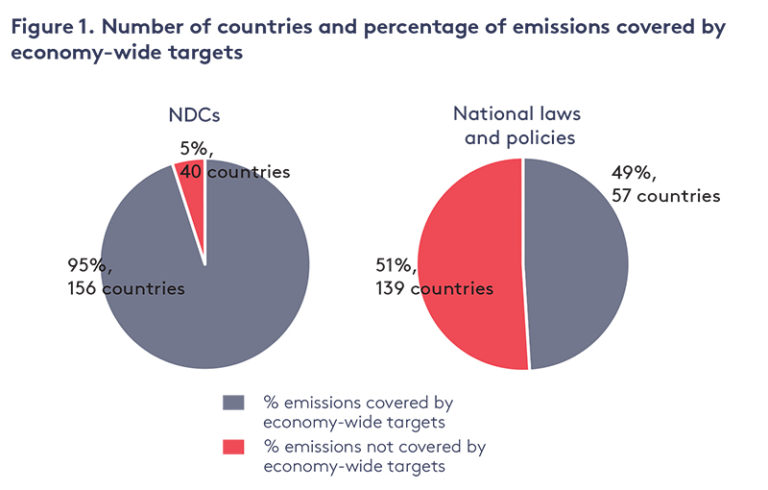Few countries have domestic targets for cuts in greenhouse gas emissions that clearly match their pledges to the Paris Agreement

Only 16 countries have set domestic targets for reducing greenhouse gas emissions that are clearly at least as ambitious as their pledged contributions to the goals of the Paris Agreement, according to an analysis published today (29 October 2018) by the Grantham Research Institute on Climate Change and the Environment and the ESRC Centre for Climate Change Economics and Policy, both at the London School of Economics and Political Science, and the World Resources Institute.
The study on ‘Aligning national and international climate targets’, by Michal Nachmany and Emily Mangan, found that 157 of the 197 Parties to the Paris Agreement have submitted ‘nationally determined contributions’ (NDCs) that include a target for reducing emissions of greenhouse gases from their economies as a whole. These 157 parties were responsible for about 95 per cent of global annual emissions in 2014.
However, only 58 of the Parties to the Agreement have set economy-wide targets for emissions reductions in their domestic laws or policies, and just 16 of these are as ambitious as, or more ambitious than, the pledges in their NDCs.
The report states: “Our analysis reveals that countries are being slow to reproduce their NDC commitments as targets in national laws and policies.”
It concludes: “Given that a gap already exists between the targets in the Paris Agreement and in countries’ NDCs, it is advisable that countries enhance the stringency and transparency of their current targets as they are expressed in their national laws and policies. This is an important step towards greater transparency over countries’ credibility to deliver on their targets.”
The study has been submitted to the Talanoa Dialogue, which was set up for countries to take stock of the gap between current pledges for action on climate change and the goals of the Paris Agreement. The ‘political phase’ of the Dialogue will take place when governments gather at the COP24 United Nations climate change summit in Katowice, Poland, in December 2018.
The 16 countries with targets in national policies and laws that are compatible with their NDCs are: Algeria, Canada, Costa Rica, Ethiopia, Guatemala, Indonesia, Japan, FYR Macedonia, Malaysia, Montenegro, Norway, Papua New Guinea, Peru, Samoa, Singapore and Tonga.
The report states: “Explicitly setting a high-level economy-wide emission reduction target helps countries to ensure that sectoral targets and policies add up to the necessary action. While it is possible to meet the overall target in a country’s NDC without setting an economy-wide target – instead setting sectoral targets or implementing sectoral policies that aggregate to the overall target – this approach presents governance challenges as sectoral policies are often overseen by different institutions (eg different government ministries), and expressed in different metrics and ways.”
The report points out that only six countries have included economy-wide targets beyond 2030 in their NDCs, while 16 countries plus the European Union have set such targets in national laws and policies.
For more information about this media release or a copy of ‘Aligning national and international climate targets’, please contact Bob Ward on +44 (0) 7811 320346 or r.e.ward@lse.ac.uk
NOTES FOR EDITORS
- The Grantham Research Institute on Climate Change and the Environment (https://www.lse.ac.uk/grantham) was launched at the London School of Economics and Political Science in October 2008. It is funded by The Grantham Foundation for the Protection of the Environment (https://www.granthamfoundation.org/).
- The ESRC Centre for Climate Change Economics and Policy (https://www.cccep.ac.uk/) is hosted by the University of Leeds and the London School of Economics and Political Science. It is funded by the UK Economic and Social Research Council (https://www.esrc.ac.uk/). The Centre’s mission is to advance public and private action on climate change through rigorous, innovative research.
- The World Resources Institute is a global research organization that spans more than 50 countries, with offices in Africa, Brazil, China, Europe, India, Indonesia, Mexico and the United States. Our more than 700 experts and staff work closely with leaders to turn big ideas into action at the nexus of environment, economic opportunity and human well-being. wri.org
-ENDS-

